TK-AXTSS Anti-Explosion Transport Safety Systems
Techno Kontrol on Transportation
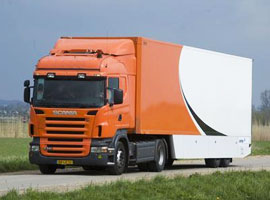
In an industry where there are more & more accidents & attacks occurring every year, we at Techno Kontrol believe that it is vital that we keep working so as to improve the quality of the products used within the Transportation Industry.
Although we are constantly working so as to bring new products to the market place, at present we can provide our customers with the following products;
- Explosion and Fire proof products which are located within the Fuel Tank and can be manually installed in less than 20 minutes.
- Techno Kontrol is currently working with many of the world’s largest insurance companies so as to reduce insurance premiums by between 15%-30% on any vehicle that carry´s our specially designed product. Please contact us for further information.
- Techno Kontrol Valves which can reduce delivery times (unloading times) by as much as 50% on all fluids, fuels, gases and chemicals.
- Explosion and Fire proof products for the Petroleum Industry i.e. Fuel Tankers or Rail Wagons delivering all fuels, gases and chemicals.
- Gas Bottles and Cylinders in which are both explosive and fire proof. This is helpful within Camping Sites, Campervans etc and again we can help reduce your insurance premium.
- Techno Kontrol will provide a lifelong service and maintenance package for any Techno Kontrol product which has been installed and maintained by one of our authorized engineers.
- Also as our products are transferable they can be obviously be used time and time again within either the same vehicle or different vehicles.
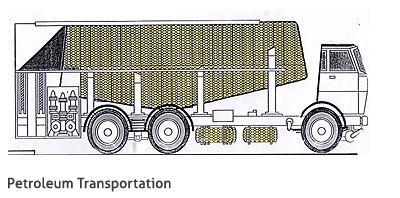
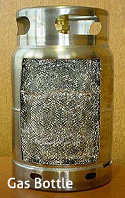
The videos located on the top right hand side of this page will show what normally happens within the transportation industry when the vehicle does not use our Techno Kontrol Product. We at Techno Kontrol will be happy to demonstrate to any potential client how we through the use of our product we can help to prevent these accidents from ever happening.
TechnoKontrol Installation on Tanker Trucks
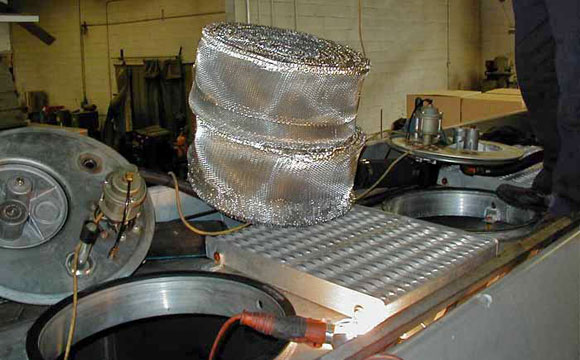
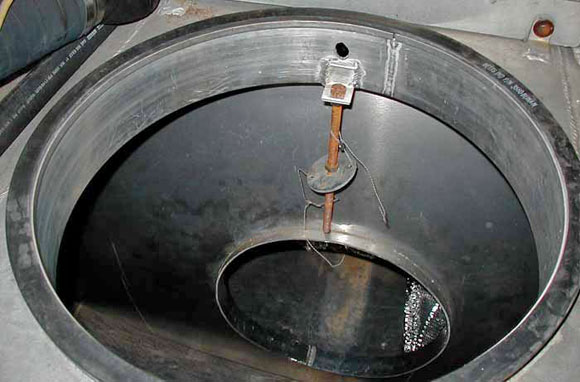
Explosions & fires without protection
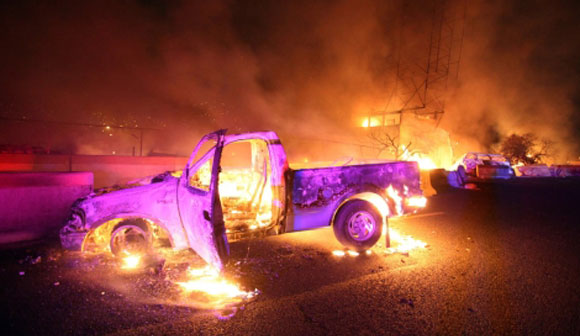
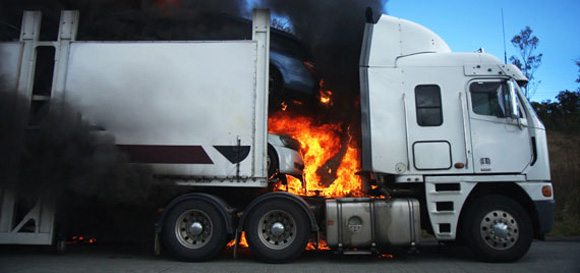
Chemical accidents, sabotage & terrorist actions against strategic national industrial, commercial, economic and transport systems.
An Anti-chemical fire fighting/chemical protection machine is seen at the site of a chemical freight train explosion trying to dispurse atmospheric chemicals which may reach the general population or even injure, kill, fire fighters, civil protection , health & safety operators, investigators, law enforcemnet operatives an and ground-aerial emergency services, etc.
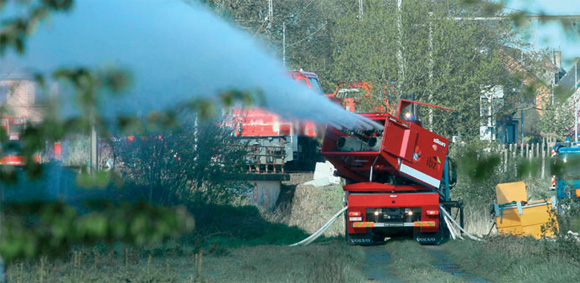
These safety & security anti-chemical contamination systems can be used, transported, installed in all types of our Technokontrol vessels, transports, safety platforms involving petro-chemical plants, storage facilities, refineries, chemical production plants, pipelines, rail freight, ports, harbors, etc.
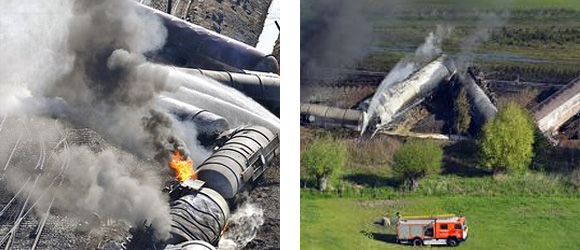
Chemical transports can not only be used for normal industrial & commercial use but also used for an easy, effective way for sabotage, terrorist, anti-system attacks in any nation at global level as chemicals accidents or incidents can be easily made into chemical explosives7explosions with the simple derailment of a train, road tanker, saboatge of port chemical refueling/discharge facilities, internal plant fires, emergency operational system closures, etc.
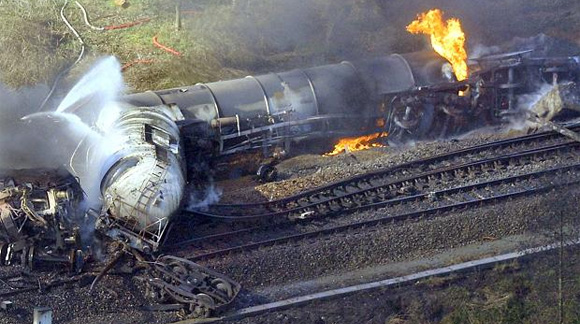
Worst of all of atmospheric chemical sabotage, terrorist attacks which can be covered as operational accidents but really have political, strategic social, media and economic intentions to effective whole transport networks and closing, evacuating town, cities, general population.
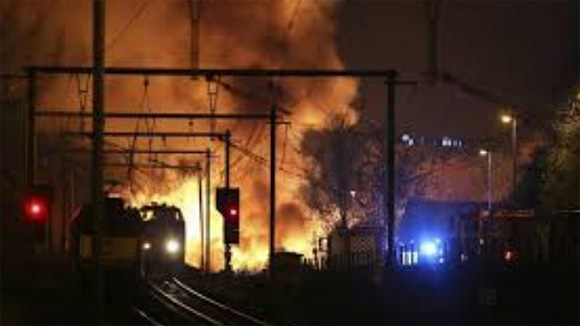
These accidents have already occured three times in the last year in Belgium where we all believe that safety and security are always of the highest european levels but as one can see these accidents or attacks can happen to any nation, operator, anywhere and at anytime globally, thus prevention, security and safety using Technokontrol technologies is and always will be paramount at all levels, especially at government, transport,law enforcement,civil protection, health & safety levels for any nation regardless of its global location.
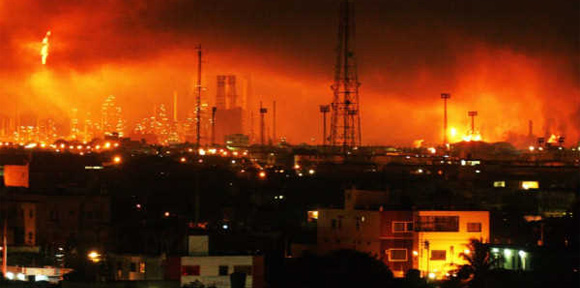
FUEL & CHEMICALS TRANSPORTED BY RAIL
THE EVER GROWING RISK FACTOR ESPECIALLY WITH EASY TERRORIST ACCESSIBILITY AND MANY MAJOR OPERATIONAL DISASTERS
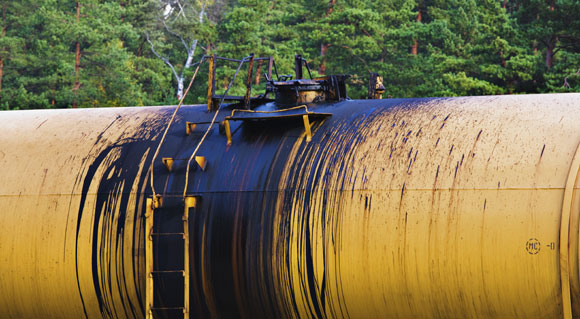
An over 4,000% increase in oil by rail transport over the last six years may seem like an exaggeration, but it’s anything but. The reality is that crude, fuels, chemicals transported by rail increasingly poses a grave threat to millions of persons globally, with over several million rail freight cars in use globally the possibility of incidents due to pure numerical statistics or operational incidents is far greater by the day but with the ever increasing number of terrorist cells whom understand the weaknesses of any nations logistics thus knowing that these logistical avenues are extremely vulnerable, very accessible and near impossible to protect as most of us can see with continuous weekly global derailments, accidents, crashes from all corners of the planet.
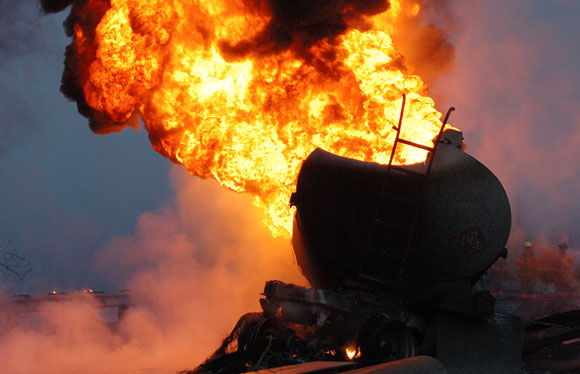
Over the last five years, many developed nations have consistently consumed less and less fuels especially in the US region. With the decreased demand for oil consumption in the US, Russia, Canada, Brazil and other oil nation producers, the oil production industry is setting its sights on increasing overseas, international markets. And what’s the fastest and easiest way for chemicals, fuels, crude to be shipped? By rail—one of the newest and least-regulated methods of shipping oil—to any international seaport that will accept it. And as this shipping practice increases, so do the number of sea port rail terminals that are able to accept and offload chemicals, oils, fuels from these giant trains.
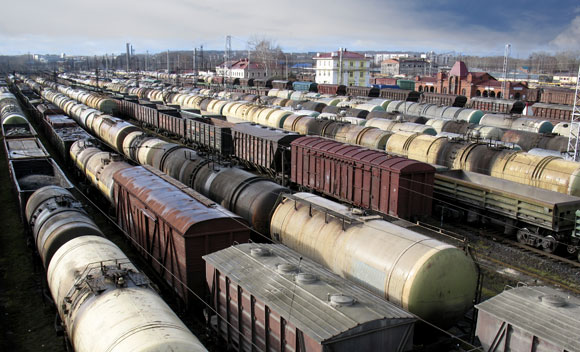
What makes oil by rail so dangerous?
There are three major factors to the danger of shipping oil by rail:
- The state of global railway networks;
- The sudden increase in the amount of rail traffic;
- And the amount of chemicals, fuels, crude oils that is being shipped per train in unsafe rail cars.
Most of the global rail networks were built 100 or more years ago. While rail tracks have been modified and maintained over the years to carry the average number of freight rail cars per train all over the country, there have been little to no modifications done to the existing rail networks to account for the over 4,000% increase in traffic. The number of freight cars and the weight of the tracks have a huge impact on the structural system—an impact that has not been addressed over the last six years.
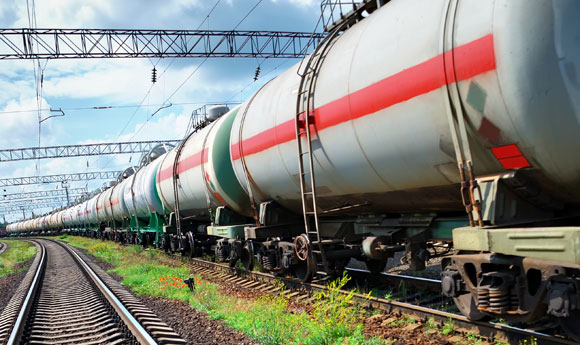
A single oil train will carry 110 or more rail cars loaded with twelve-fifteen million liters of crude oil—enough to fill four and a half football stadiums. When so much explosive fuels, chemicals, oils are put on a single train, and sped down tracks that haven’t been upgraded for this increased traffic, every freight train is a great concentration of risk.
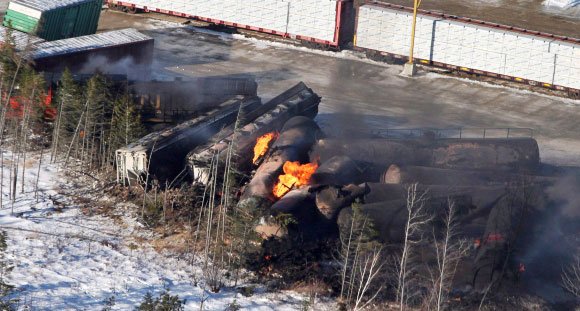
To make matters worse, the rail cars that hold these millions of liters of chemicals, fuels, crude oil are extremely dangerous. Over 80% of them are built to old 1970s standards and incredibly likely to rupture, crack, break in any accident, operational incident and even easier in the event of an terrorist attack. Sparks from the wheels, breaking systems failures, rail track debris, low maintenance combined with outdated rail freight cars—some even carrying crude oil, fuels, chemicals with a tendency to self-ignite—is a recipe for an atomic-nuclear sized explosive disaster.
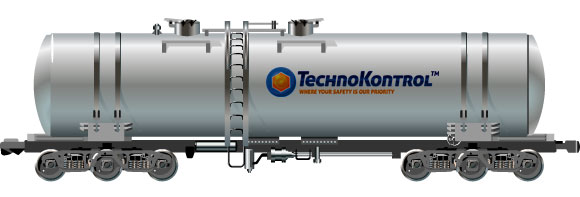
Explosion Videos
NFPA - U.S. Highway vehicle fires and deaths by year
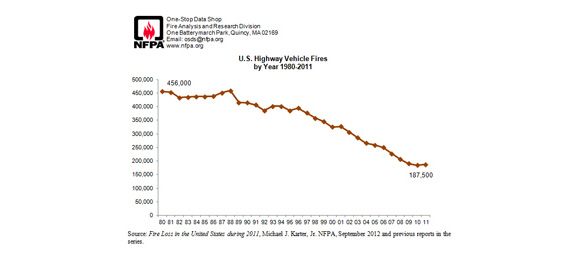
U.S. Highway Vehicle Fires by Year 1980-2000
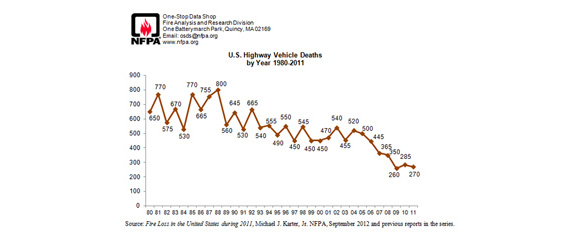
U.S. Highway Vehicle Deaths by Year 1980-2000
| Year | Highway vehicle fires | Civilian deaths | Civilian injuries | Direct property damage (In billions) As reported |
Direct property damage (In billions) In 2011 dollars |
| 1980 | 456,000 | 650 | 2,850 | $0.5 | $1.3 |
| 1981 | 453,000 | 770 | 2,900 | $0.5 | $1.2 |
| 1982 | 433,000 | 575 | 3,250 | $0.5 | $1.2 |
| 1983 | 435,500 | 670 | 3,400 | $0.6 | $1.3 |
| 1984 | 437,000 | 530 | 3,250 | $0.6 | $1.4 |
| 1985 | 437,000 | 770 | 3,250 | $0.7 | $1.4 |
| 1986 | 438,000 | 665 | 2,850 | $0.7 | $1.4 |
| 1987 | 451,000 | 755 | 2,900 | $0.7 | $1.5 |
| 1988 | 459,000 | 800 | 2,750 | $0.8 | $1.5 |
| 1989 | 415,500 | 560 | 2,750 | $0.8 | $1.4 |
| 1990 | 415,000 | 645 | 3,025 | $0.8 | $1.4 |
| 1991 | 406,500 | 530 | 2,675 | $0.8 | $1.4 |
| 1992 | 385,500 | 665 | 2,750 | $0.8 | $1.3 |
| 1993 | 402,000 | 540 | 2,400 | $0.9 | $1.4 |
| 1994 | 402,000 | 555 | 2,325 | $1.0 | $1.5 |
| 1995 | 386,000 | 490 | 2,275 | $1.0 | $1.5 |
| 1996 | 395,000 | 550 | 2,075 | $1.1 | $1.6 |
| 1997 | 377,000 | 450 | 1,950 | $1.1 | $1.5 |
| 1998 | 358,500 | 545 | 2,050 | $1.1 | $1.6 |
| 1999 | 345,000 | 450 | 1,600 | $1.1 | $1.5 |
| 2000 | 325,000 | 450 | 1,325 | $1.2 | $1.5 |
| 2001 | 327,000 | 470 | 1,750 | $1.3 | $1.6 |
| 2002 | 307,000 | 540 | 1,700 | $1.2 | $1.5 |
| 2003 | 286,000 | 455 | 1,400 | $1.1 | $1.3 |
| 2004 | 266,500 | 520 | 1,300 | $1.0 | $1.2 |
| 2005 | 259,000 | 500 | 1,450 | $1.0 | $1.2 |
| 2006 | 250,000 | 445 | 1,075 | $1.0 | $1.1 |
| 2007 | 227,500 | 365 | 1,500 | $1.1 | $1.2 |
| 2008 | 207,000 | 350 | 850 | $1.2 | $1.2 |
| 2009 | 190,500 | 260 | 1,455 | $1.1 | $1.1 |
| 2010 | 184,500 | 285 | 1,440 | $1.0 | $1.0 |
| 2011 | 187,500 | 270 | 1,020 | $1.0 | $1.0 |
Highway vehicles include any vehicle designed to operate normaly on highways, such as automobiles, motorcycles, buses, trucks, and trailers, but not manufactured homes on foundations.
Direct property damage figures do not include indirect losses, like business interruption. Inflation adjustment to 2011 dollars is done using the consumer price index.
Techno Kontrol Transportation & Auto Industry
Videos
- Food Truck Explosion
- Lift Truck Explosion
- Gas Explosion Escape
- Bus Gas Explosion
- Gas Tanker Explosion
- City Gas Explosion
- Kuwaiti Fire Service/Civil Defense Live Government Tests
- Real live government demos (8 tests)
- Gas Cylinders Truck Explosion on Highway
- Train explosion
- Car explosion
- Truck explosion
- Motorcycle explosion
- Cars on fire
Techno Kontrol Transportation
- TK Outdoor Tests Presentation - Fire Services / KNPC Kuwait
- Technical video
- Fuel Barrel Flame Ignition & Welding Test - Prueba de Ignición y Soldadura en un Barril de Combustible
- Security Test (SPA) - Prueba de Seguridad
- Heat Conductivity of TK Alloys - Conductividad térmica de malla TK
- Fuel Vaporization Test - Prueba de vaporización de combustible
- Types of TK Alloy Formats - Formatos de presentación de malla TK
- Liquids balance
- NFPA USA Vehicle Fires/Deaths/Injuries/Financial Loss from 2003-2007 Data
- CNG and Hydrogen Vehicle Fuel Tank Failure Incidents, Testing, and Preventive Measures
- Supersport Motorcycle Regulations (Spanish)
- FIM Road Racing World Championship Grand Prix Regulations (English - French)
Reports
Industries
- Petroleum Industry
- Construction Industry
- Transportation & Auto Industry
- Aviation
- Maritime
- Military & Security
TechnoKontrol Wikipedia

TechnoKontrol: 1st in Spain for own Technology patents 2013 & 2014

- Ministerio de Industria Turismo y Comercio-OEPM
Technokontrol, the number 1 corporation in Spain filing for its own technology patents, trademarks and utility patents (SPA) - OEPM 2013 The year in numbers (SPA)
TechnoKontrol has been fully verified and certified by Bureau Veritas
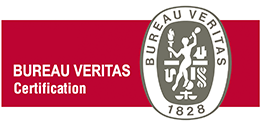
Certificates
- ISO 9001 - ES108784-1
- ISO 14001 - ES108782-1
- ISO 45001 - ES108783-1
- ISO 4126
- ISO 28000
- ISO 37000
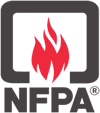
NFPA-National Fire Protection Association
NFPA-Asociación Nacional de Protección contra el fuego
TechnoKontrol is a member of the NFPA
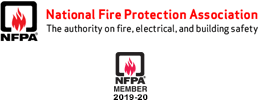
NFPA 69: Standard on Explosion Prevention Systems, 2016 Edition
Prevent deflagration explosions due to combustible dust particles, gases or vapors with NFPA 69. Combustible dust, gases and vapors produced in industrial settings can pose a significant safety hazard.NFPA 69: Standard on Explosion Prevention Systems offers definitive guidance on explosion protection and prevention systems.
ATEX - European Antiexplosive Safety Directives

- ATEX Guide: Protection in explosive atmospheres
- ATEX-EU/HAZLOZ-USA/NFPA-USA/DSEAR-UK/Explosion Directives TechnoKontrol Additional Anti-Explosion Data
- ATEX Directive in EU Directives
Dangerous Substances and Explosive Atmospheres Regulations - United Kingdom/ATEX

United Nations Economic Commission for Europe - UNECE - TechnoKontrol

- TechnoKontrol information for the UNECE BLEVE working group
Proposal transmitted by the governments of Spain and France
The European Parliament and The Council

Technokontrol's Products & Services are insured by

TK-Global Engineering - Where efficiency and reliability become a reality


USA Chemical Safety Board
An independent federal agency investigating chemical accidents to protect workers, the public, and the environment.
About the CSB
CSB Safety Videos
- Chevron Richmond Refinery Explosion
- Deadly Contact
- West, Texas Real Live Blast Damage Video
- Hot Work - Dupont Explosion
- Static Sparks Explosion in Kansas
- Danger of Flammable Gas Accumulation
Articles
- Energy Sector Vulnerabilities: Petroleum (Spanish)
